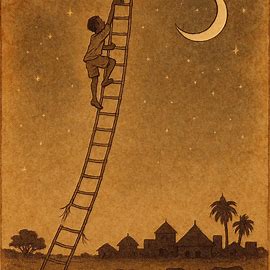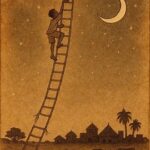Long ago, in the heart of Zambia, people believed that the sky hung close to the earth, resting over them like the roof of a vast shelter. It was so low that anyone could raise a hand and brush its surface. In some places, the sky drooped loosely, dangling like the folds of a mosquito net spread over a bed at night.
Inside this low-hanging sky lived the Gods and ancestral spirits, ever watchful and attentive. From their heavenly dwelling, they could hear the songs, laughter, quarrels, and prayers of the people below. Communication between humans and the divine was effortless, prayers were answered swiftly, blessings were granted without delay, and disputes were easily resolved with divine guidance.
But this closeness came with a burden. The gods were constantly disturbed by the endless chatter of human beings. Women spoke tirelessly, filling the air with noise, while children smeared their dirty hands across the sagging folds of the sky, staining and defiling the home of the spirits. The sacred dwelling became filthy, and the gods grew restless and weary. Yet for a long time, they endured, reluctant to act against their beloved human children.
READ: How Kalulu Outsmarted the Cruel Chief: A Zambian Bemba Folktale
The Day of Harvest
One season, after a plentiful harvest, the women of the earth gathered together for the great pounding of corn. Mortars filled the village, and the air resounded with the rhythmic beat of heavy pestles striking grain. Hundreds of wooden pounding sticks rose and fell in unison, creating a thunderous chorus of sound.
But as the pestles swung upward, they struck the sky again and again, pushing and jabbing at its soft, low-hanging surface. The heavens trembled as if under attack. The women, lost in their chatter and work, did not notice that their sticks bruised and shoved the gods themselves.
To make matters worse, the voices of the women rose in ceaseless gossip and laughter, echoing across the earth and into the heavens. For the gods, the noise was unbearable, like endless drums pounding without pause. Some were jostled about violently; others were knocked from their rest. The annoyance was so great that the gods could no longer ignore the behaviour of humankind.
The Decision of the Gods
Alarmed and exasperated, the gods convened an urgent council. They spoke of the endless noise, the filth smeared upon their home, and the blows they suffered from careless mortars.
“If this continues,” said one spirit, “we shall never know peace. Their pestles bruise us; their words exhaust us. Our dwelling has become unliveable.”
Another added, “We must act. The sky cannot remain so close. Humans must learn that even the divine has limits.”
So, in that sacred council, they reached a final decision: the sky must be lifted higher, beyond the reach of mortars, voices, and dirty hands. Only then would peace return to the realm of the gods.
The Sky Is Raised
At once, the gods put their plan into action. With great force, they pushed the sky upward, higher and higher, until it soared far beyond the tallest trees and mountains. The folds that once brushed the heads of humans were stretched and smoothed until the heavens became distant and vast.
The women looked up in astonishment, their pestles now striking only empty air. No longer could they touch the sky as they once had, and their voices no longer carried directly to the ears of the gods. From that day forward, the sky remained far above, unreachable and untouchable.
The gods, finally free from the noise and disturbance, retreated into their high abode, where no careless hand or thoughtless chatter could trouble them again.
Moral Lesson
This Zambian folktale reminds us that carelessness and lack of respect can drive away the blessings and closeness we enjoy. The people once lived so near to the divine that their voices and actions were immediately felt. But through thoughtless chatter and disregard for sacred boundaries, they lost that closeness.
The story warns us to honour the spaces we share, whether with the divine, with elders, or with one another. Respect, humility, and mindfulness preserve harmony; disrespect and noise push even the closest bonds away.
Knowledge Check
Q1: Why was the sky once low in this Zambian folktale?
A1: It hung close to earth like a roof, allowing humans to touch it and speak easily with the gods.
Q2: What disturbed the gods the most about human behaviour?
A2: The endless chatter of women, children’s dirty hands staining the sky, and pestles poking them during corn pounding.
Q3: What event finally forced the gods to act?
A3: The harvest-time pounding of corn, when countless pestles struck the sky and the noise became unbearable.
Q4: What solution did the gods decide upon?
A4: They raised the sky far above the earth, out of human reach, to restore peace.
Q5: What lesson does the story teach?
A5: Disrespect, carelessness, and noise can drive away blessings and closeness; respect preserves harmony.
Q6: What is the cultural origin of this folktale?
A6: It is a Zambian folktale, told among the Bemba people.
Folktale Origin
Source: Kalulu the Hare and Other Zambian Folk-Tales, Bemba folktale, Zambia.







